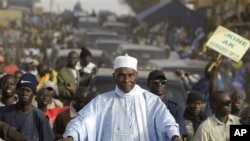Senegal goes to the polls Sunday amid tension and continued calls from the opposition for incumbent President Abdoulaye Wade to withdraw his controversial bid for a third term.
It is Wednesday in Dakar, four days before the presidential election. Opposition demonstrators march peacefully downtown toward their as-of-yet unattained goal, the Place de l'Independence, which the government has declared off-limits to protestors.
The past week of almost daily protests has seen clashes between demonstrators throwing hunks of rock and mounting flaming barricades and police firing tear gas and rubber bullets.
"Let them kill us," one protester said, "we believe in ourselves and we believe in God. All that matters is that Wade steps down."
The opposition says President Abdoulaye Wade's bid for a third term is unconstitutional following a reform he signed into law in 2001 that limits presidents to two terms.
However, the presidentially-appointed Constitutional Court validated Wade's candidacy at the end of January. The reform, they said, did not apply retroactively to his first term.
Since then, local media reports that pre-election violence has killed at least 10 people, sparking fears that this regional bastion of stability and democracy is headed for trouble.
Wade has dismissed the opposition's campaign as "temper tantrums."
Just two days before the end of campaigning, he addressed a half-full stadium in a Dakar suburb.
Wade says the opposition are poor politicians and sore losers. They have lost, they have lost, he repeats. He says they have let down their supporters who are welcome to join me as I have the law, the constitution and the construction of Senegal on my side.
Bodyguards, faces obscured by Zorro-like masks of ripped yellow t-shirts, encircled the president's black limousine as he rolled on to another rally, standing aloft through the open moon-roof waving to supporters.
Seynabou Faye says Wade is the best president for Senegal because of all that he has built. She says he has built hospitals, pre-schools and roads. She says before Wade came to power she had to take three buses to get downtown but the president has improved transport and now there are buses that take you straight there.
Wade says he wants to finish several large-scale projects, including a new airport outside Dakar. Even his opponents concede that the president has made great strides with regard to infrastructure, however they have criticized expensive vanity projects, like the $27 million Monument to the African Renaissance, as wasteful.
Ibrahima Fall is one of 13 opposition candidates and a leader of the protest movement in Dakar.
Fall says there has been corruption, impunity, misappropriation of funds, and increasing difficulties for families trying to meet their daily needs. He says failures in youth, education, health, tourism and environmental sectors explain the falling out between the Senegalese people and Wade's government.
Wade came to power in 2000 in what is widely known as l'Alternance, or the Great Change. After losing in four previous elections, the lawyer and university professor's win that year inspired hope among many of the same voters who have now taken to the streets to call for his retirement.
Filmmaker Leuz Niang says when President Wade returned from France in 1999, he remembers welcoming him at the airport and running behind his car with other young people all the way to his house. He says Wade has since disappointed him. He says they have to take to the streets to make him step down because votes won't make him leave power.
Critics say the 85-year-old president wants a third term so he can transfer power to his unpopular son and current government minister, Karim.
Senegalese political analyst Babacar Justin Ndiaye says Wade came to power as a hero expected to fix all of the country's problems, but the realities of governing and political maneuvers aimed at holding on to power have distanced him from the population. He says this election has become risky. He says we have seen violence that could become an all-out explosion of unrest, particularly in the days following the vote.
Former Nigerian president Olusegun Obasanjo is in Dakar attempting to ease tensions on behalf of the joint African Union/ECOWAS election observation mission.
President Wade's camp says the incumbent will not entertain requests to step down and the poll will proceed as planned.












